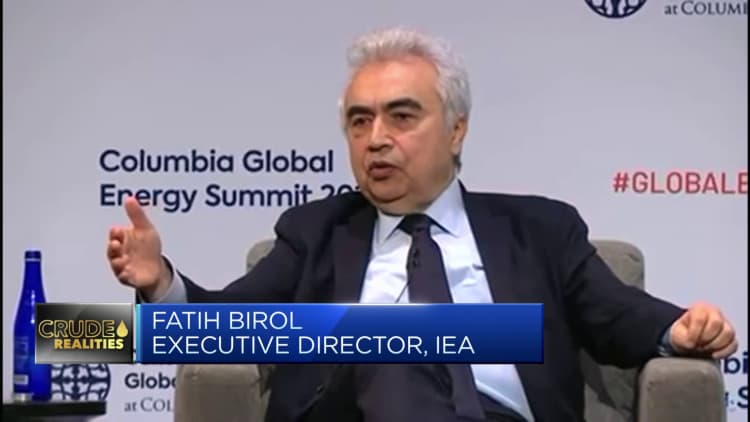OPEC says IEA should be careful with calls to stop investing in oil
OPEC Secretary General Haitham Al Ghais said finger-pointing and misrepresenting the actions of OPEC and OPEC+ was “counterproductive.”
Anton Petrus | Moment | Getty Images
Oil producer group OPEC on Thursday lashed out at the International Energy Agency, saying the world’s leading energy authority should be “very careful” about undermining industry investments.
OPEC Secretary General Haitham al-Ghais said finger-pointing and misrepresenting the actions of OPEC and OPEC+ was “counterproductive.” He added that the influential group of 23 oil-exporting exporting nations was not targeting oil prices, but instead focusing on market fundamentals.
OPEC said that its comments came in response to fresh criticism from the IEA, without providing further details.
In a Bloomberg TV interview on Wednesday, IEA Executive Director Fatih Birol used similar language in warning OPEC about boosting oil prices.
Birol said that the energy alliance, led by Saudi Arabia, should be “very careful” with its production policy, warning that the group’s short-term and medium-term interests appeared to be contradictory. He added that higher crude prices and upward inflationary pressures would result in a weaker global economy, with low-income nations likely to be disproportionately affected.
“The IEA knows very well that there are a confluence of factors that impact markets. The knock-on effects of COVID-19, monetary policies, stock movements, algorithm trading, commodity trading advisors and SPR releases (coordinated or uncoordinated), geopolitics, to name a few,” Al-Ghais said.
Blaming oil for higher inflation was “erroneous and technically incorrect as there are many other factors causing inflation,” he added.
Surprise output cuts
Earlier this month, the Paris-based energy agency said surprise oil output cuts from OPEC+ risked exacerbating a projected supply deficit and could scupper an economic recovery.
Several OPEC+ members announced on April 2 that they were set to tighten global production by an additional 1.16 million barrels per day until the end of the year.
The decision, which the White House criticized, was said to have been made as part of an independent initiative unlinked to broader OPEC+ policy.

The cuts add to Russia’s existing plans to trim 500,000 barrels per day of its production from March until at least the end of the year. It means the combined voluntary cuts of OPEC+ members will be in excess of 1.6 million barrels per day.
“Other energy markets have been far more volatile,” al-Ghais said, “with oil markets less so, mainly due to the stabilizing role of OPEC and the OPEC+ group.”
“If anything will lead to future volatility” he added, “it is the IEA’s repeated calls to stop investing in oil, knowing that all data-driven outlooks envisage the need for more of this precious commodity to fuel global economic growth and prosperity in the decades to come, especially in the developing world.”
Fraught relationship
The relationship between OPEC and the IEA has been…
Read More: OPEC says IEA should be careful with calls to stop investing in oil
